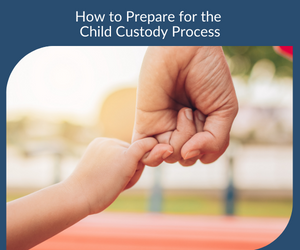
When parents are entering a divorce and/or a custody proceeding, a lot more is at stake than themselves and their material and monetary items—the importance of their relationship with their children and their children’s future will likely surpass everything else.
We understand the amount of stress this situation can bring, and highly advise those going through a divorce, which include custody matters, to consult with an experienced family lawyer who can guide them along the way so they can help to achieve the best outcome for all involved. In addition, being prepared for the child custody process, including how to prepare for a child custody evaluation, can also help. Here is some information to get you started:
The Child Custody Process
The process of determining child custody is based on a series of state statutes and rules as well as local rules that are county specific. It is wise for someone going through this process to review their court’s website in the county where their child lives, to review the state laws and rules, and most importantly consult with a trusted and experienced attorney. In many counties, a mediation session will be held with a court-appointed mediator. If the parents are unable to reach a mediated agreement, then they may move on to a conciliation and/or hearing before a judge or another court employee with expertise in custody matters. During this process, a child custody evaluation may be requested by the court.
Understanding What a Child Custody Evaluation Is
A child custody evaluation is when the court orders the parties to be evaluated by a court appointed psychologist who reviews the situation and makes a recommendation as to a custody arrangement that is in the psychological best interests of the child. The process can vary since each family’s situation is unique, but it may include some or all of the following: a questionnaire for the parents to complete, documentation such as school, criminal, and medical records, multiple interviews with the child(ren), each parent, and those connected with the child, psychological evaluations of the family members, standard personality testing, and observations of the parent/child interactions. Once the court receives the report on the evaluations, it will hold a conciliation or move forward with trial to determine the custodial arrangement that is in the best interests of the child.
RELATED: Read these 5 tips for setting co-parenting boundaries.
How to be Prepared for a Child Custody Evaluation
The child custody evaluation process can be more successful if one is prepared for it. Here are a few tips on how to be prepared:
- Consult with an experienced attorney.
- Be truthful and show how the children are the priority.
- Refrain from speaking negatively about the other parent.
- Provide any relevant collateral information that may be useful for the evaluator.
- Be as involved as possible in the custody process (e.g., ask questions, be prompt, and prepare to make a good impression such as by dressing neatly).
In addition to the information above, it is important to know that courts tend to recommend that both parents are involved with the children if both parents are capable of providing appropriate care. Therefore, sole custody is more the extreme than the norm. Allowing a child access to both parents is usually considered the best option for the child’s physical, mental, and emotional health and development. As a result, custody hearings usually concern each parent’s access to and responsibility toward the child.
If you find yourself in this situation, the attorneys of Wilder Mahood McKinley & Oglesby have experience in child custody and visitation matters and can help. Since 1978, we have assisted clients across western Pennsylvania in resolving family-law issues. For information about what we can do to help you in your divorce and/or child custody case, contact us online or call our office in Pittsburgh, Pennsylvania, at 412-261-4040.
FAMILY LAW SERVICES
Divorce
Legal Separation
Prenuptial & Postnuptial Agreements
Tax Issues
Fees
Adoption
Same-Gender Marriage
Domestic Partnerships
Child Custody
Family Support
Mediation in Divorce Matters
Collaborative Law Services










